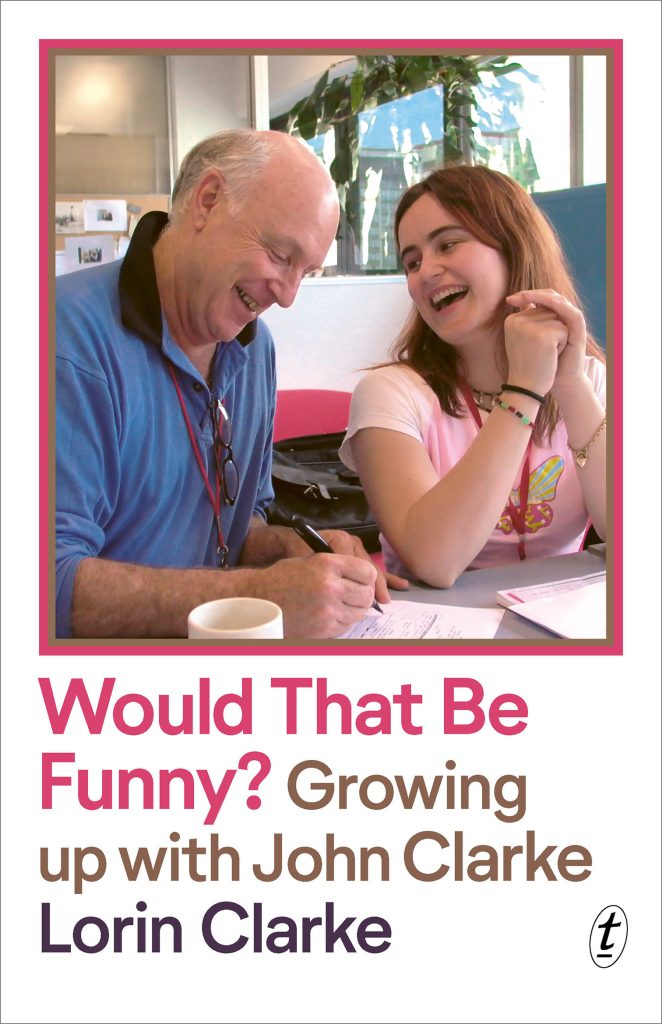Author: Lorin Clarke
Publisher: The Text Publishing Company
Reviewer: Stephen Keim
My generation were shocked when news came through, on 9 April 2017, that John Clarke had died from a massive heart attack experienced while bushwalking with his wife and friends in the Grampians at Dunkeld, Victoria.
The body of work produced by Clarke is immense. My particular memories centre around hearing him do Fred Dagg sketches played on ABC radio on Saturday mornings; religiously watching Clarke and Bryan Dawe doing their Clarke and Dawe mock interviews after the 7.30 Report on weekday evenings and The Games,that very close to the bone, comedy series.
By the time Fred Dagg was being played on radio in Australia, both Clarke and the character were household names in New Zealand.
The author, “Lorin”, to avoid confusion with her father, is the oldest of Clarke’s two daughters and a writer reasonably well-known for her series of audio fiction podcasts, broadcast on the ABC, portraying life in inner suburban Melbourne, The Fitzroy Diaries.
The epigraph to Would that be Funny? comprises the single line, “Tuck early and keep your feet together”. Perhaps, not obviously, that is advice on the how tos of high board diving. The source of that advice was Clarke, himself.
The epigraph is symptomatic of the type of unexpected things that Lorin shares with the reader about her father, a person we, in many ways, thought we knew well if only because of the strength of his own persona as well the strength of the characters he portrayed across his career.
Clarke, it turns out, was, as a young man, excellent at sports. One of the sports was diving. In middle age, he decided, at a Melbourne pool where he happened to be, to demonstrate whether he could still do it. Turns out, luckily, he still had it and his demonstration dive for no one in particular was near perfect despite the passing of all those years. “Tuck early and keep your feet together”, then, is good advice perhaps only bettered by something like: Don’t try high board diving at any age.
Would that be Funny? is a daughter’s tribute to her famous father. It is a portrait of the impact within a family of a sudden death of one of the members thereof. While Clarke is the acknowledged star of the piece, Would that be Funny? presents Clarke in the context of his family. Lorin goes to pains to place emphasis on all parts of that context as well as on Clarke, himself. The family consists not only of Clarke, his academic art historian wife, Helen, Lorin and her younger sister, Lucia. The four grandparents form key parts of the context since they all played key parts in Clarke’s development and life. Even the pets get to play important roles in Would that be Funny?
Clarke’s own parents suffered in various ways during the Second World War. It affected them and affected their relationship and resulted in their marriage and subsequent marriages failing. Clarke’s father treated Clarke and Clarke’s mother poorly. Remarkably, Clarke managed to remain close to both parents and both mother and father got to spend lots of time in the houses in which Lorin and Lucia grew up and play big roles in the life of the girls and the family as a whole, albeit, that it was arranged that their visits not coincide in temporal terms.
Clarke’s in laws were much kinder and Lorin has Clarke crediting that kindness and the acceptance that they showed him when Helen first brought him home as being crucial to his rebuilding the confidence that had been sapped by the difficulties Clarke had experienced growing up.
In presenting Clarke in the context of his family, Would that be Funny? also presents the dynamics of that family. From the viewpoint of the older daughter, Would that be Funny? also manages to present Clarke in and out of the family and between the family context and his creative work context.
“Would that be Funny?” is actually a quote from Lorin of something said when very young and, like many historical phrases within the family, used for friendly mocking down the years. Would that be Funny? is also a guide to the psyche of the person whom the reader mourns as having been incredibly creative and massively funny. Between chapters of narrative, Lorin provides a glossary revealing a private language of abbreviations and mispronunciations shared by everyone in the Clarke extended family. Clarke’s propensity to leave recorded phone messages scannable in free verse is also illustrated by numerous examples.
The opening chapter of Would that be Funny? starts in the sharp pain of the recent sudden death but it ends with the heart warming of experience of receiving in the post a bundle of every letter that Clarke had sent to his daughters’ primary school asking for permissions and money for excursions and other extra-curricular activities. Every one of these is a creative masterpiece. Every one is side splittingly funny. A principal of the school had instructed the lady in the office to collect every note Clarke wrote for posterity and the lady in the office carried out her part of the deal and returned the bundle by post after Clarke’s death.
At the end of Would that be Funny?, the reader has learned that it is no coincidence that we love every piece of creative endeavour that Clarke ever embarked upon. We learn that Clarke and Dawe is not an astonishingly original piece of comedy that has emerged from the brain of someone who is otherwise a boring dolt.
Rather, the reader has learned that John Clarke was an amazing observer of life and that he saw, in everything he observed, the joys and sadnesses and odd things of life that we humans can best deal with mediated through humour.
John Clarke understood what was funny and knew how to recreate that humour through creative activity. At the end of his day, his humour and creativity came from his capacity also to be an amazing human being.
Lorin has directed a feature length film, But Also John Clarke, about her father which was released at the Melbourne International Film Festival in August 2025.



